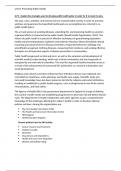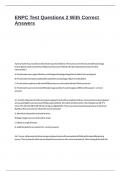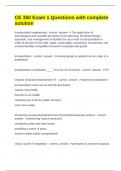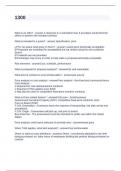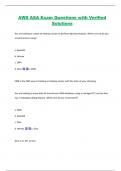A.P1 - Explain the strategies used to develop public health policy in order for it to meet its aims.
The laws, rules, activities, and choices that are enacted within society in order to promote
wellness and guarantee that specified health goals are accomplished are referred to as
public health policy.
The art and science of avoiding illnesses, extending life, and improving health via society's
organised efforts is characterised as public health (World Health Organisation, 2019). The
history of public health is a pursuit for effective techniques of guaranteeing population
health and preventing disease. Epidemic and endemic infectious illness stimulated rational
reasoning and advancement in disease prevention, frequently before the aetiology was
scientifically recognised. Defining illnesses, measuring their incidence, and seeking effective
therapies are all important aspects of disease prevention in communities.
Public health progressed via trial and error, as well as the extension and development of
scientific medical understanding, which was at times contentious and was frequently re-
energised by war and natural calamities. The need for organised health protection arose as
a result of the advancement of communal life, particularly as a result of urbanisation and
social development.
Religious and cultural convictions influenced how infectious disease was explained and
controlled via cleanliness, urban planning, and health care supply. Scientific study and
increased knowledge have also been viewed as harmful by religions and social institutions,
resulting in roadblocks to public health progress, such as disagreements over birth control,
immunizations, and food safety.
The Agency of Health (DH) is the government department in England in charge of defining
the country's health needs and establishing programmes to decrease risk and detect disease
early. The Department of Health collaborates with other agencies to get a comprehensive
knowledge of the challenges affecting the nation's health in order to develop national
policies and laws. Among the organisations are:
The Care Quality Commission (CQC)
The Health and Social Care Information Centre
NHS England
Health Education England.
Present policies from the DH include:
Cancer research and treatment
Children’s health
Dementia
Drug misuse and dependency
Health and social care integration
Obesity and healthy eating
, Unit 8: Promoting Public Health
Each of these policy concerns is subdivided into more specific areas of interest. 'School
Food,' for example, examines caterers' efforts to include healthier foods into school menus,
and contains studies from Public Health England, Government Buying Standards, and the
Children's Food Trust.
The Secretary of State for Health receives reports from the Scottish Health and Social Care
Directorate on the health and well-being of its population in 14 regional health authorities.
To offer safe, effective, and person-centred healthcare, the health services collaborate with
partners and the general public. 'Greater Health, Better Care,' a recent policy that was part
of the Quality Strategy, advocated that NHS personnel, patients, and caregivers should have
a better understanding of their rights and obligations. Compassionate personnel, strong and
clear communications, a safe workplace, and clinical expertise are all goals of this method.
The Public Health Agency (PHA) in Northern Ireland strives to improve people's health and
reduce disparities. The PHA is responsible for reporting to the Department of Health
(Northern Ireland). 'Making Life Better,' a recent approach, was designed to assist
individuals in taking better responsibility of their own health and to have health services
support them in doing so.
The 'Together for Health' NHS Wales policy aims to enhance health care for the benefit of
Welsh people. 'Working differently – working together' is another NHS Wales plan that
outlines how to enhance health information in the future.
A.P2 - Explain how monitoring information to determine patterns of health and ill health
is used by government to inform the creation of public health policy.
Monitoring people's health is an essential part of keeping the country healthy. Local,
regional, and governmental authorities can put in place the required resources by closely
monitoring disease outbreaks or the growth in the occurrence of very harmful illnesses.
Without public health reporting, public health monitoring is ineffective. The main goals of
public health reporting are to inform 'those who need to know' about the condition of a
population's health and to help the preparation and evaluative phases of health policy
making and health care planning. As a result, without reporting, public health monitoring
will be unable to effectively impact policymaking. The public health monitoring reporting
role can take numerous forms, including reports, pamphlets, and articles.
The Reporting of Injuries, Diseases, and Dangerous Occurrences Regulations (RIDDOR)
requires companies to report any diseases or illnesses affecting their employees that may be
caused by the workplace. This is helpful in calculating the healthcare requirements of
specific vocations. The information can also be utilised to determine whether any further
precautions are necessary for certain jobs. DRAFT 154 Promoting Public Health Employers
may believe that such incidences are isolated but reporting them to the HSE may reveal that
they occur regularly in specific occupations. The data may be utilised to help workers stay
healthy and implement safe working practises.

